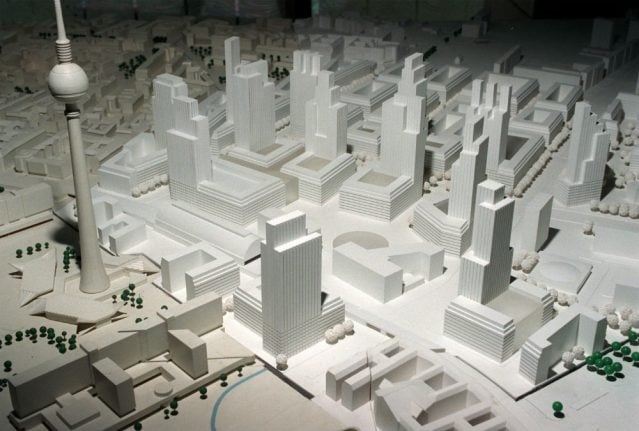Only on paper does Berlin’s Alexanderplatz bear any resemblance to New York City’s skyscrapers and tall apartment buildings.
In 1993, the architect Hans Kollhoff's redesign of the central square was presented to the capital’s Senate. A blueprint for an American-style city centre, his design for the bustling square won over the jury. But Kollhoff's architectural dreams have been slow to materialize.
Famed for being the location of the capital’s highest structure, the Fernsehturm, “Alex” – as locals call it – currently has a reputation as a focal point of petty criminality. The square is not exactly known as an architectural gem, boxed in as it is by Plattenbauten from the days when it was the centre of communist East Germany.
But that's about to change, says construction director of the Berlin Senate, Regula Lüscher, who’s been leading the project on the development of the square.
 A view over Alexanderplatz in 2016. Photo: DPA
A view over Alexanderplatz in 2016. Photo: DPA
Due to over two decades of delays involving protests by local residents, rescheduling and doubtful investors, no progress has been made on construction of the ten high-rise buildings in Kollhoff's plan.
One of the plan's weak points is that it corresponds more to an American cityscape such as that of New York or Chicago than to a European metropolis, according to Lüscher.
“The senate hasn't completely given up on the plan. But 25 years ago confidence in the future was huge – and also the feeling that they could develop Berlin in a completely new way,” Lüscher said.
Now there is new impetus in the Senate to push planning forward. The first excavators could soon roll into the square.
“Things could start moving very quickly,” Lüscher said.
The application for a skyscraper at the Alexa shopping centre, for instance, has already been submitted and after initial review it was found to align with Kollhoff's development plan. Though generally not considered the most beautiful building in Berlin, as a Twitter user below points out, Alexa recently celebrated its tenth birthday.
“Alexa, was ist das hässlichste Gebäude in Berlin?” pic.twitter.com/2XrvqQ1p2L
— alf frommer (@siegstyle) December 19, 2017
Preliminary approval has also been given to a tower next to Alexa financed by Russian investment group Monarch. Another 150-metre-high tower, designed by well-known American architect Frank Gehry, is planned directly where the Saturn department store currently stands.
But in other areas, the wheels seem to be falling off the ambitious plan.
One thing that has changed since 1993 is how Berlin views the architectural legacy of the GDR. Two of the skyscrapers in Kollhoff's plan are unlikely to ever be built as they were planned for construction where the former German Democratic Republic (GDR) Haus des Reisens and the Haus des Berliner Verlages currently stand. These two legacies of communism are now protected buildings.
Also according to Kollhoff’s plan, the Park Inn hotel at the square was to be demolished. But now, at 125 metres high, the hotel has been heavily invested in. Instead its owners want to build two more towers adjacent to the hotel – one of them an identical “twin tower.” The other proposed tower is to be 150 metres high and will contain offices, a hotel, shops and flats.
 Haus des Reisens. Photo: DPA
Haus des Reisens. Photo: DPA
But the body for safeguarding building culture in Berlin, the Baukollegium, is sceptical that the Park Inn plans could lead to solitary high-rise buildings with different heights sprouting up around the square.
This is a concern that has also been expressed by the Berlin Architecture Association (AIV).
“Every new project on Alexanderplatz needs to fit into the overall aesthetic,” the AIV said in a statement. “If the interests of the property owners and the pragmatism of the city officials combine, then it will be complete coincidence if something good comes out of it.”
On the question of whether more skyscrapers could provide a solution to the growing housing shortage in the capital, Lüscher is wary.
“When it comes to affordable living space, high-rise buildings are not the first choice,” she said, explaining that this can be attributed to costly fire safety requirements.
“Areas with monuments or nature will be excluded from high-rise construction,” she assured, adding that even at locations where high-rise buildings are possible, building permits are not guaranteed.
Meanwhile local authorities are already in the process of developing plans for construction on high-rise real estate. But Lüscher was remaining tight-lipped on which parts of the city would one day touch the clouds.
“We don’t want to fuel speculation,” she said.
SEE ALSO: Rebuild of Kaiser's palace in central Berlin on schedule to open next year



 Please whitelist us to continue reading.
Please whitelist us to continue reading.